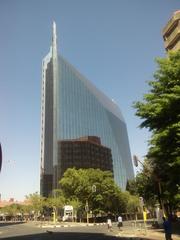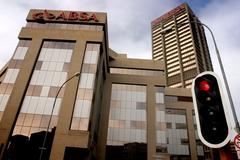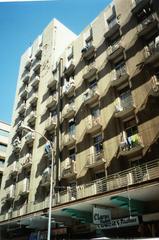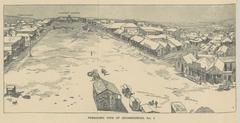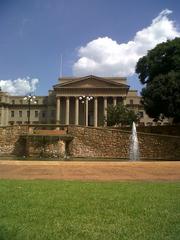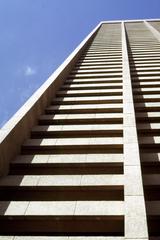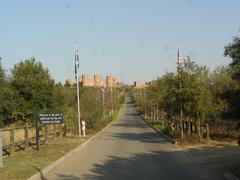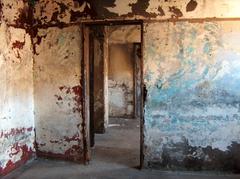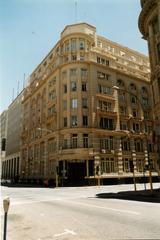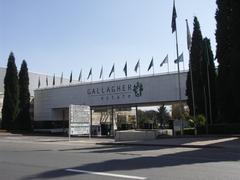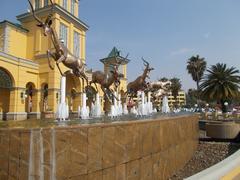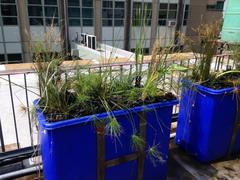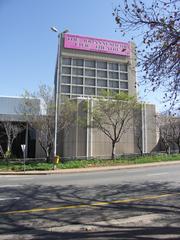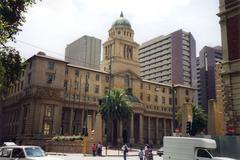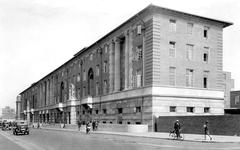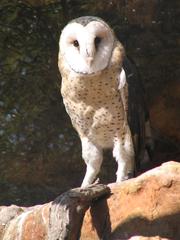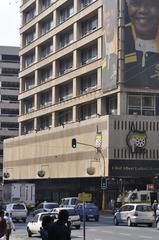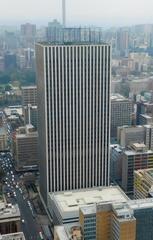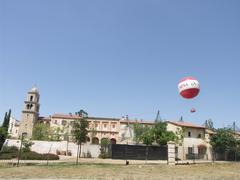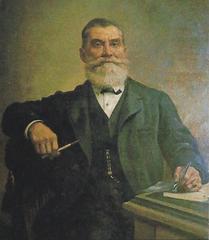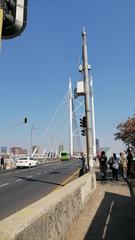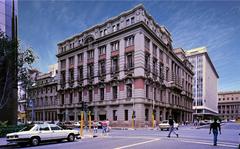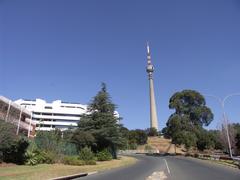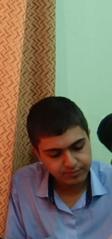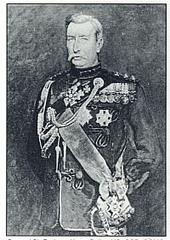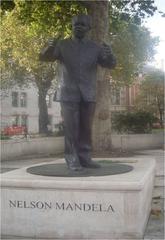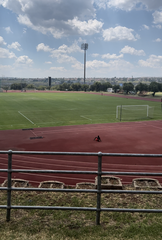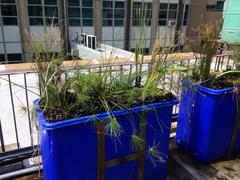Fordsburg Square Visiting Hours, Tickets, and Travel Guide: Johannesburg Historical Sites
Date: 14/06/2025
Introduction: Fordsburg Square’s History and Significance
Fordsburg Square, located in the heart of the vibrant Fordsburg suburb in Johannesburg, stands as a powerful symbol of the city’s rich multicultural heritage and dynamic history. Established in 1888 during Johannesburg’s rapid expansion after the Witwatersrand gold rush, the square has evolved from a modest open-air market into a bustling cultural and commercial hub. Its story is woven with the experiences of diverse communities—Jewish, Indian, African, and Middle Eastern—that have shaped its unique identity over more than a century (Heritage History; Johannesburg 1912).
Fordsburg Square played a central role in landmark events such as the 1922 Rand Rebellion and the anti-apartheid movement, making it historically significant within the broader context of South African history (Wikipedia; Gauteng.net). Today, it offers visitors a vibrant marketplace, notable culinary experiences—especially South Asian and Middle Eastern cuisine—and an authentic window into Johannesburg’s urban culture.
Fordsburg Square: Historical Overview
Origins and Early Development
Fordsburg was established in 1888 by Lewis Peter Ford and Julius Jeppe on land previously part of the Langlaagte farm, in response to Johannesburg’s explosive growth following the gold rush (Heritage History). Fordsburg Square was soon designated as an open-air market, mirroring the larger Market Square in central Johannesburg, and quickly became the commercial and social nucleus of the suburb (Johannesburg 1912).
Demographic Shifts and Community Life
From its earliest days, Fordsburg was home to a remarkable mix of communities. The establishment of the Fordsburg/Mayfair Hebrew Congregation in 1893 and the arrival of Indian traders and artisans reflect the area’s diverse character (Wikipedia). Despite early efforts at segregation, Fordsburg’s central location ensured ongoing demographic diversity.
The 1922 Rand Rebellion
Fordsburg Square was the epicenter of the 1922 Rand Rebellion, a violent uprising by white miners opposing the employment of cheaper African labor. The government’s heavy-handed suppression left a lasting mark on the area; a commemorative plaque in the square honors those affected (Gauteng.net; inafricaandbeyond.com).
Apartheid Era and Resistance
During apartheid, Fordsburg was designated a “whites-only” area, resulting in forced removals. Many Indian residents resisted these efforts, helping Fordsburg retain its multicultural essence. The square became a hub for anti-apartheid activism, with notable figures, including Nelson Mandela, spending time in the area (inafricaandbeyond.com; Wikipedia).
Post-Apartheid Renaissance
With the end of apartheid, Fordsburg Square flourished as a vibrant melting pot of cultures, drawing immigrants from across Africa, the Indian subcontinent, and the Middle East (Gauteng.net). The adjacent Oriental Plaza, established for Indian traders during apartheid, remains a major commercial and cultural center.
Visiting Fordsburg Square: Practical Information
Visiting Hours & Entry
- Fordsburg Square: Open public space, accessible 24/7.
- Markets & Shops: Most active from 10:00 AM–8:00 PM on weekdays, and until 10:00 PM on weekends. Night markets thrive on Friday and Saturday evenings (inafricaandbeyond.com).
- Oriental Plaza: Monday–Saturday, 9:00 AM–5:00 PM; closed Sundays.
- Entry Fee: None; the square, markets, and Plaza are free to enter (SA-Venues).
Accessibility
- Fordsburg Square and Oriental Plaza are pedestrian-friendly, with wheelchair access in most shops and restaurants. Some surfaces outdoors may be uneven.
- Public restrooms (including accessible facilities) are available in the Oriental Plaza.
Getting There
- By Car: Secure parking at the Oriental Plaza and nearby lots; avoid leaving valuables in view.
- Public Transport: Rea Vaya Bus Rapid Transit stops nearby. Ride-hailing services (Uber, Bolt) are highly recommended (In Your Pocket).
- Walking: The area is walkable during daytime; exercise caution at night.
What to See and Do
Markets and Shopping
- Fordsburg Flea Market: Offers fresh produce, spices, textiles, electronics, and traditional crafts.
- Oriental Plaza: Over 360 shops selling textiles, jewelry, spices, and more (The Scribs and Nibs).
- Bargain Shopping: Haggling is customary; look for unique fabrics, custom tailoring, and imported goods.
Culinary Experiences
- Street Food: Enjoy South Asian, Middle Eastern, and African cuisine—try kebabs, dosas, curries, and sweet treats like jalebi and baklava.
- Halal Dining: Most eateries are halal, and the area is alcohol-free, fostering a family-friendly atmosphere (Africa Wanderlust).
Cultural & Religious Sites
- Mosques and Temples: Open to respectful visitors outside of prayer times.
- Commemorative Plaque: Honors the 1922 Rand Rebellion.
- Community Events: The area comes alive during cultural and religious festivals, especially Ramadan and Eid.
Arts and Community Spaces
- Bag Factory: Local gallery and artist studios.
- Street Art: Murals and public art narrate the area’s migration and resilience stories.
Nearby Attractions
- Mayfair Hebrew Congregation: Historic synagogue.
- Brickfields: Early Indian settlement area.
- Newtown Cultural Precinct: Museums, theaters, and galleries.
- Museum Africa: Explores South Africa’s history and culture.
Safety and Visitor Tips
- Fordsburg is considered safe during market hours, but visitors should remain vigilant, especially at night.
- Avoid carrying large amounts of cash; use ATMs inside the Plaza.
- Dress modestly, especially when visiting religious sites.
- Petty theft can occur in crowded areas; keep belongings secure (Passports and Grub).
Shopping and Practical Information
- Payment: Most shops accept cards; smaller vendors may be cash-only.
- Facilities: Public restrooms in Oriental Plaza; Wi-Fi in some cafes.
- Accommodation: Lodging available in nearby Newtown, Braamfontein, and Sandton (SA-Venues).
- Languages: English is widely spoken; other languages include Afrikaans, Zulu, Urdu, and Hindi.
Frequently Asked Questions
Q: What are the visiting hours?
A: The square is always open. Markets and shops are busiest from 10:00 AM–8:00 PM (weekdays) and until 10:00 PM (weekends).
Q: Is there an entry fee?
A: No, Fordsburg Square and its markets are free to enter.
Q: Are guided tours available?
A: Yes, several operators offer guided walking tours—book in advance.
Q: Is it family-friendly?
A: Yes, the area is welcoming to families and children.
Q: Is Fordsburg Square safe?
A: It is generally safe during the day and market hours; use usual urban precautions.
Conclusion
Fordsburg Square is a living testament to Johannesburg’s resilience, diversity, and community spirit. From its pivotal role in the city’s formation and historical events to its vibrant markets and culinary offerings, it provides an authentic glimpse into the city’s multicultural tapestry (inafricaandbeyond.com; Gauteng.net). The adjacent Oriental Plaza, its festivals, and its welcoming atmosphere make it an essential stop for travelers seeking the heart of Johannesburg’s urban life (Wikipedia; SA-Venues).
Explore Fordsburg Square on a lively weekend evening, join a guided tour, and immerse yourself in its unique blend of cultures. For more travel resources, download the Audiala app, follow local updates, and check our related guides on Johannesburg’s historical sites.
References
- Heritage History
- Johannesburg 1912
- Wikipedia
- Gauteng.net
- In Africa and Beyond
- SA-Venues
- Joburg ETC
- Africa Wanderlust
- The Scribs and Nibs
- Citizen
- In Your Pocket
- Passports and Grub
- Wildest Official
